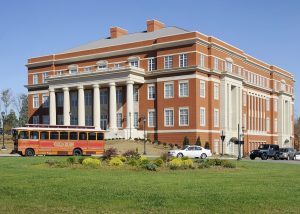Facilities Overview

The Bioinformatics Research Center is located in a $35M, 75,000 g.s.f. building on the Charlotte Research Institute Campus of UNC Charlotte. The building offers space for both wet and dry laboratories, and includes core facilities for gene expression, proteomics, microscopy, crystallography, and computing. The 1st floor of the Bioinformatics building houses much of the building infrastructure, including a building-wide recirculating DI water system. This floor has a 36-seat computer classroom, a 93-seat tiered auditorium for seminars and a vending area. It also has a loading dock and rooms designed for storing gas cylinders and chemicals.
The 2nd floor has 6 generic 550 sq. ft wet labs, a larger proteomics lab, 2 conference rooms, freezer room, and various shared lab facilities within the BSL-2 zone. This floor also has a multipurpose classroom seating 90, a videoconference room, a graduate student area, other conference rooms, and 29 offices.
The 3rd floor is similarly arranged with 6 generic wet labs, but also has the BSL-3 suite, a server room, and larger areas for graduate students. The Bioinformatics Research Center operates two computer clusters, an IBM 500 core machine with 55 TB storage, and an Apple 144 processor cluster with 30 TB storage. We also operate four high-memory (128 GB) multi-core computers and a 4 processor FPGA cluster (TimeLogic).
Additional genomics and proteomics core facilities are available through a UNC Charlotte partnership with the Carolinas Medical Center.
The BRC has also taken a leadership role in developing Bioinformatics programs in collaboration with the developers of the North Carolina Research Campus, a billion-dollar, 350-acre research park that is home to research programs of a large number of private biotechnology companies as well as university and medical research programs. The BRC will develop a Center of Excellence in Bioinformatics at the North Carolina Research Campus at Kannapolis, eventually hiring several faculty with research interests at both locations. This will be a research, educational and service Center with a focus on the development of novel analytical methods for knowledge discovery in large biological datasets. Research at the Center will enable basic and applied researchers to ask and answer complex questions in molecular and population biology, to manage and navigate the vast data sets that are generated by modern molecular biology methods, and to translate the results into practical benefits through understanding of the interacting effects of health, nutrition, development, and behavior.